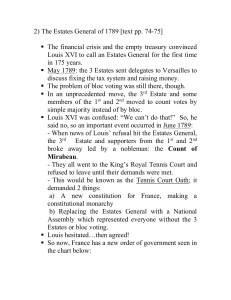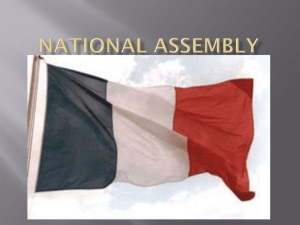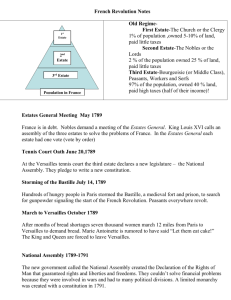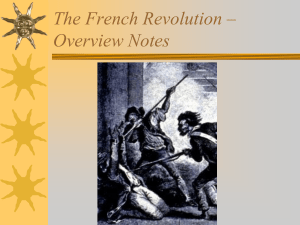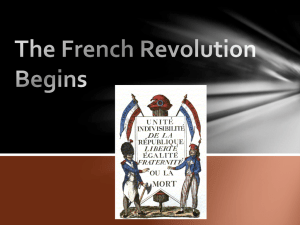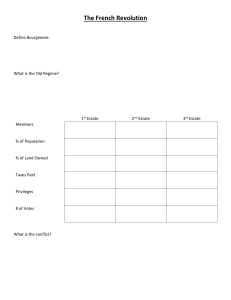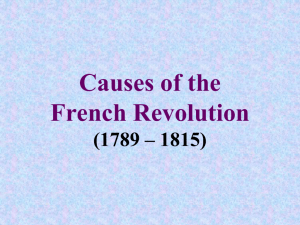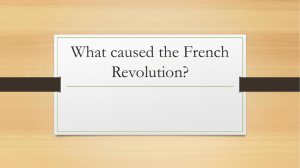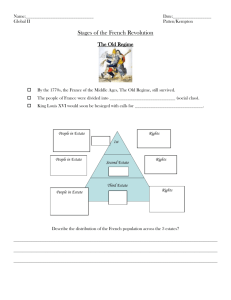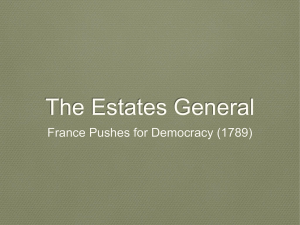French Revolution - Duluth High School
advertisement
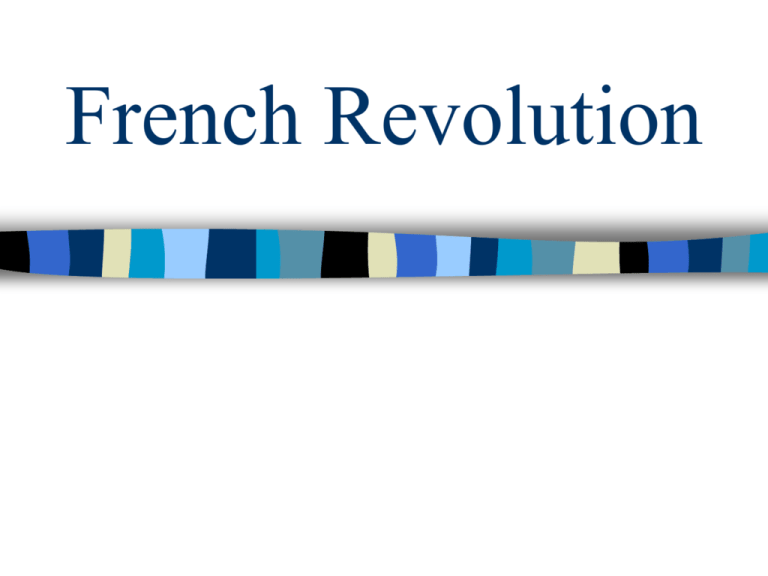
French Revolution Financial Crisis By the end of the 18th Century, France was spending more than it brought in through taxes By 1788, 50% of the budget went to pay for the interest on the national debt; 25% for military; 6% for king & court life-styles Taxes were raised; but tax burden on peasants not clergy or nobility Meeting of the Estates General 1789--To solve financial crisis and raise taxes, King Louis XVI called for the Estates General to meet 3 Estates (classes of society): –First Estate—Clergy –Second Estate—Nobility –Third Estate—Commoners The First Estate 1st ESTATE – consisted of officials of the Catholic Church. - They owned 10% of land, but were less than 1% of population. - They were very rich (except for the priests). - They did not have to pay taxes, but gave a gift of 2% to the government. The The Second Estate The 2nd Estate – consisted of nobility, who made up 2% of the total population. - Owned 20% of the land. - They held all of the important political, military, and religious positions in society. The Third Estate The 3rd Estate – consisted of the middle class, urban lower class, and peasant farmers. - The 3 groups made up 98% of population. Forced to pay ½ of income to taxes. - Bourgeoisie (middle class) – were educated and wealthy. And they wanted more status and political power. Meeting of the Estates General Estates General voted as separate orders instead of individual votes. The Third Estate refused to conduct business until they could meet as a single representative body. • This never happened. Meeting of the Estates General 3rd Estate broke away and adopted the title National Assembly and said they were the “true” representative body of France. July 20, 1789 National Assembly swore Tennis Court Oath—will not disband until new constitution is written The The Tennis Court Oath On June 20, 1789, the National Assembly was excluded from Versailles because of “repairs” so they met in an indoor tennis court. There they swore the famous “Tennis Court Oath”, pledging never to disband until they had written a new constitution for France. National Assembly Established constitutional monarchy which king accepted in July 1791. National Assembly had power to make laws, but king remained head of the state and could veto any law. King vetoed many laws; National Assembly had very little “real” power Storming of the Bastille By July 1789, 25% of people were unemployed, bread prices high, many people without food. Rumor spread that the kings troops were coming to sack Paris, so angry crowds seized arms to defend the city. July 14, 1789 hundreds marched to the Bastille , a medieval fort and political prison, to find gun powder Storming of the Bastille The commanding officer refused to give up the gunpowder and fired on the crowd. Killed 98 people. Revolutionary crowds took Bastille—symbolized beginning of French Revolution March on Versailles Unemployment and hunger increased October 5, 1789 7,000 women marched to palace of Versailles to demand bread Women invaded palace and killed guards Bread was given and Louis never returned to Versailles. Execution of Louis XVI The King and his family were caught trying to flee the country. He agreed to sign the Constitution of 1791, then proceeded to veto revolutionary decrees. (King no longer has absolute power.) A new, more radical gov’t was elected in 1792 – the National Convention. Execution of Louis XVI In November 1792, incriminating documents were found that proved the king was negotiating secretly to restore his authority and dismiss the Constitution. Execution of Louis XVI National Convention overwhelmingly convicted Louis of treason but sentenced him to death by one vote in 1793 Queen Marie Antoinette executed too Reign of Terror National Convention led by Maximilien Robespierre; called for “drastic measures” to save France from other “enemies of the state”. In France, Robespierre tried citizens for treason against the Revolution Reign of Terror In two years, 40,000 people killed July 1794, Robespierre was executed by the guillotine; his execution ended Reign of Terror Napoleon Bonaparte After Robespierre, France run by a 5-man board called the Directory—was disastrous Napoleon seized power from Directory; ruled France as emperor & dictator (1799-1814) Estates General Meeting of 3 Estates to fix France 1789 National Assembly Limited Monarchy; but King vetoed all laws Execution of the King National Convention Radical; Led by Robespierre Directory 5 Men Ruled France for 5 Years Napoleon Dictator of France 1799

